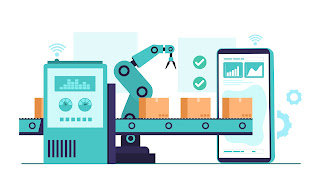In the ever-evolving world of manufacturing, staying competitive requires speed, efficiency, and consistent quality. One of the most effective ways to achieve this is through industrial automation. Today, businesses of all sizes are turning to automated technologies to improve production processes, reduce costs, and ensure better product quality.
But what exactly is industrial automation, and why is it gaining so much attention in the manufacturing sector? In this blog, we’ll explore the top benefits of using industrial automation in manufacturing, showing how it’s transforming industries with smarter, faster, and more reliable systems.
What is Industrial Automation?
Industrial automation refers to the use of technologies such as control systems, software, robotics, and other industrial equipment to perform tasks with minimal human intervention. This includes everything from simple assembly line machinery to fully automated smart factories equipped with sensors, PLCs, and AI-based systems.
In short, automation allows manufacturers to shift from manual labor to machine-driven production, improving every aspect of the workflow—from raw material handling to finished product packaging.
Key Benefits of Industrial Automation in Manufacturing
1. Increased Efficiency
One of the biggest benefits of industrial automation is improved efficiency. Machines can operate 24/7 without fatigue, breaks, or downtime. Automated systems perform repetitive tasks much faster than human workers, helping to reduce production cycles and increase output.
Key Points:
- Reduces cycle times.
- Boosts production rates.
- Streamlines material flow and logistics.
- Minimizes idle time in operations.
2. Reduced Operational Costs
While the initial investment in automation can be high, it pays off in the long run through cost savings. Automated systems help companies reduce labor costs, energy use, and waste. Since machines don’t require salaries, benefits, or leave time, companies can save significantly over the years.
Key Points:
- Lower labor and overhead costs.
- Energy-efficient operation of industrial equipment.
- Reduced waste and raw material usage.
- Optimized use of manufacturing space and resources.
3. Improved Product Quality
Automation ensures precision and consistency, reducing the chances of human error. This is especially important in industries where product quality and compliance standards are strict. Robots and CNC machines work with exact measurements, producing parts and products with minimal variation.
Key Points:
- High repeatability in tasks.
- Less rework and scrap.
- Real-time quality checks using vision systems or sensors.
- Easier to meet industry and safety standards.
4. Enhanced Workplace Safety
Manufacturing environments often involve hazardous tasks like lifting heavy loads, handling chemicals, or operating hot machinery. Automation protects workers by assigning dangerous or physically strenuous jobs to machines.
Key Points:
- Fewer workplace injuries.
- Safe handling of toxic or hazardous materials.
- Automated emergency shutdowns and alerts.
- Better compliance with safety regulations.
5. Increased Production Flexibility
Modern automation systems are highly adaptable. With simple programming or reconfiguration, machines can switch between different tasks or product lines. This flexibility allows manufacturers to respond quickly to market changes, customer demands, or product customization.
Key Points:
- Easy reprogramming of machines.
- Quicker time-to-market for new products.
- Custom manufacturing without major system changes.
6. Better Data Collection and Monitoring
Automation technologies like sensors, IoT devices, and industrial software enable real-time monitoring of equipment and processes. This data can be used for preventive maintenance, production planning, and continuous improvement.
Key Points:
- Track production performance.
- Predict and prevent machine failures.
- Analyze trends for process optimization.
- Transparent and auditable operations.
7. Higher Return on Investment (ROI)
Though the upfront costs of automation can be significant, the long-term savings and performance gains offer a strong ROI. Companies often see payback within a few years due to increased productivity, reduced waste, and better product quality.
Key Points:
- Fast ROI with strategic implementation.
- Long equipment lifespan with lower maintenance.
- Scalability of automation systems for future growth.
8. Consistency in Manufacturing Processes
Automation provides standardized operations, ensuring that every unit produced meets the same quality and dimension. This consistency is critical for industries like electronics, automotive, and food & beverage, where precision is key.
Key Points:
- Elimination of variation in output.
- Automated calibration and adjustments.
- Uniform quality across high-volume production.
9. Sustainable Manufacturing
Sustainability is a growing concern across industries. Industrial automation helps reduce energy usage, minimize waste, and manage resources more efficiently. Environmentally conscious production is not just a trend—it’s becoming a requirement.
Key Points:
- Reduced carbon footprint.
- Lower material wastage.
- Smart energy monitoring and consumption control.
- Compliance with green manufacturing standards.
Real-Life Applications of Industrial Automation

Here are a few industries benefiting from automation:
Automotive: Robots handle welding, painting, and assembly lines.
Pharmaceuticals: Precise mixing and filling of drugs in sterile environments.
Electronics: Pick-and-place machines for PCB assembly.
Food & Beverage: Automated packaging and quality control.
Textiles: High-speed fabric cutting and stitching.
Each of these industries has improved efficiency, reduced defects, and increased safety through automation technologies.
Conclusion
Industrial automation is no longer optional—it's a necessity for businesses aiming to stay ahead in the competitive manufacturing landscape. From cutting costs to boosting efficiency and ensuring consistent product quality, the advantages are clear and measurable.
Whether you're a small workshop or a large factory, automation can streamline your operations and prepare your company for the future. Investing in modern industrial equipment and smart technologies now will not only improve your manufacturing process today but also open the door to long-term growth and innovation.
Make your move toward automation and let your factory run smarter, safer, and faster than ever before.

No comments:
Post a Comment